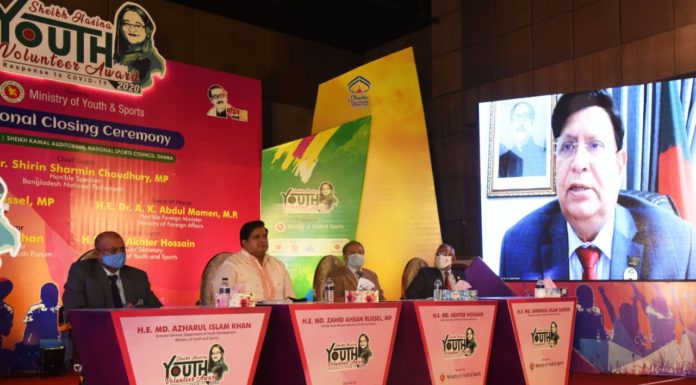Webinar on ‘Revisiting Contemporary Peace and Security Challenges in the South Asian Region”
Speech by
H.E. Dr. A K Abdul Momen, Hon’ble Foreign Minister, Government of the People’s Republic of Bangladesh
Dhaka,Bangladesh,Sunday, 27 June 2021
Bismillahir Rahmanir Rahim
H.E Ambassador Fazlul Karim Chairman, and DG Major Emdadul Bari of Bangladesh of Institute of International Strategic Studies ( BIISS)
Esteemed panelists,
Excellencies,
Distinguished Audience,
Ladies and Gentlemen!
AssalamuAlaikum. Peace be upon you.
I am humbled to speak in this august gathering on a topic so relevant for us. Let me start with my homage to the memory of our Father of the Nation Bangabandhu Sheikh Mijibur Rahman as we are celebrating the birth centenary of the great leader, tribute to the memory of 3 million martyrs, and 2 lac women who had to endure sacrifices their honor during our War of Liberation in 1971. I express my thanks and gratitude to BIISS for organizing the Webinar titled ‘Revisiting Contemporary Peace and Security Challenges in the South Asian Region” which, I believe, would provide food for our thoughts and rethink about the contemporary peace, security and challenge nexus existing in the South Asian region.
I congratulate the esteemed panelists for their diligent discussion on overall peace and security challenges in our neighborhood in the context of ever evolving geo-political reality.
Distinguished guests,
We are currently living in a world, where the world rapidly shifting from a uni-polar to a multi-polar reality and consequently, the international system itself is exposed to profound instability. A host of non-traditional security issues such as pandemics, terrorism, drug trafficking, influx of persecuted people like Rohingya, piracy and ecological disasters, internal hostile rules against their own minority population based on ethnicity or religion leading to fear and uncertainty among others, has come to feature prominently in regional and global politics. States understood the value of multilateral cooperation and conversely, the price of non-cooperation in facing these challenges. In other words, non-traditional security has reinforced the neo-liberal faith in institutions as the custodians of international norms and values. In the post-Cold War period, despite the emergence of non-traditional security issues, traditional security and economic challenges continue to dominate the priority list for the nation-states. In this backdrop, South Asia as a region needs to decipher the challenges and opportunities that might emerge from these new systemic shifts in order to sail through the troubled water of an impulsive global order. The number of traditional wars between states is falling, while insurgencies, civil war and sectarian rifts are on the rise in the global and South Asian security landscape. With ever intensifying globalising world, we know, these problems have global manifestations and all the nations by and large share a common fate.
Esteemed audience,
You are well aware, in Bangladesh, under the prudent leadership of our Prime Minister Sheikh Hasina, we have adopted “zero tolerance” policy against all forms and manifestation of terrorism and violent extremism. We have even walked extra miles to ensure peace and stability in Bangladesh and beyond. The Government of Bangladesh remains extremely vigilant to counter cross border terrorism. Hon’ble Prime Minister’s pledge that we will not allow any extremist or terrorist to use our territory for perpetrating terrorist activities against any other country, has literally been translated into action.
Likewise, other countries in the region have also made earnest efforts to maintain peace and security within their territory. But in an intricately globalized world, amid inter-dependence and close interactions between the states, efforts for maintenance of peace and security in isolation within one’s own territory hardly culminate to ultimate stability. Traditional rivalry exists among the regional countries. It would be beneficial if the regional leaders realize the common challenges and act accordingly to harmonize the peace process through synchronized efforts as peace and security in one country is guaranteed by the simultaneous harmony in the neighbouring countries. Alongside, most of the South Asian Nations undergo certain internal factors which have, over the decades, polarized the region resulting in disintegration despite convergence in socio-economic condition, common cultural values, shared ethos and identical memory of past colonial regime.
The sooner we prioritize our common thrust for prosperity and roadmap to end hostilities and mistrust, the better. Practice of overarching democratic values in judicious way in every country of the region would potentially drive away the divergences.
Ladies and Gentlemen,
Pandemic COVID-19 has opened our eyes to the new realities that we must consider while we strive to move forward. With every passing day, the world is countering new and deeper fallouts of the COVID-19 pandemic on countries and communities across the globe. The evolving pandemic has proliferated beyond a health crisis into a growing threat on socio-economic systems and livelihoods. Unfortunately, we are likely to confront new challenges. Global and regional cooperation has been badly affected by the onslaught of the Pandemic. Since the outbreak of the tiny but mighty enemy, vulnerability of human society and system has been exposed. We have discovered with awe and disappointment, that global politics and affluence-power nexus have the overpowering dominance in the global society and we wonder if the way to procure vaccines would be smooth at all as the bilateral cooperation is not the only deciding factor.
I am happy to mention here that Bangladesh could initiate and adhere to a form of ‘vaccine diplomacy’ which ensures diversified sources of vaccines. Due to the sudden sweep over of Covid-19 cases in neighboring countries, it is imperative that South Asian nations should receive their share of the vaccine and that too without any strings attached. In addition, we demand Covid vaccines to be a public good and its technology should be shared and available to all countries to produce it at an affordable price.
The pandemic illustrated that political leaders, scientists, and citizens cannot operate in isolation during health crises. Rather, health emergencies must be viewed as global security crises that require coordination and cooperation among all stakeholders. To obtain the full health, societal, and economic benefits of vaccines, programs must be coordinated, inclusive, and equitable. Stronger regional and international cooperation is necessary in the coming days for mitigating the impact of the pandemic and for the rebuilding phase.
Distinguished Colleagues,
We have seen how an act of mindless persecution in a particular territory could affect the security and stability landscape of a region. The long standing Rohingya crisis in Myanmar has continued to haunt not only Bangladesh but the South Asian region as a whole. Once an internal matter for Myanmar, this has now destabilized the regional tranquility of South and Southeast Asia and triggered a global outcry. The strategic location and untapped natural resources of Rakhaine state have made Myanmar a strategic partner of the major world and regional powers. They started strengthening political and economic ties with Myanmar in the form of trade, investment, normalization of diplomatic relations in the hope that this would lead towards democratization of the country. In the backdrop of recent political turmoil in Myanmar, the international community must realize that Myanmar has a long history of persecution of its own people specially Rohingyas from the country under the pretext of security operations. The culture of impunity has taken a deep root in Myanmar due to the country’s lack of willingness to bring the perpetrators to justice. It would have been more encouraging to get the world community assertively vocal on severe restrictions of movement, health care, education, access to mobile and internet and livelihood opportunities in Rakhine – thereby fostering an environment conducive for voluntary repatriation. For the greater interest of this persecuted people and the stability of the region, the Rohingya crisis needs to be resolved in a durable manner with utmost priority. It is better if the regional leaders understand early, that statelessness of a large ethnic group on the face of persecution might turn a volcano open, if not treated with promise and action to serve justice.
Distinguished Audience,
Due to growing dependence on virtual resources and rapid technological developments, cyber security landscape poses a significant challenge across South Asia. Social affinity among the states of South Asia has opened avenues for similar cyber crimes in social level affecting individuals. On the other hand, cyber attacks on the commercial and legal entities are also very common in this part of the world. It may turn into a serious matter of concern in the context of the ongoing pandemic when the entire world has been forced to enter into an unprecedented mode of virtual communication. To ensure that national security and confidentiality is not compromised, countries of the region need to be equipped with cyber intelligence and appropriate political and regulatory process.
Ladies and Gentlemen,
South Asian countries must understand the long-term benefits of regional and multilateral cooperation. In successful multilateral agreements, an even-playing field can assist all cooperating countries in developing their economies, promoting good governance, and supporting cross-border infrastructure projects. In South Asia, multilateral cooperation can support the development of stronger transportation systems, better connectivity, collective action against climate change, which may become a security problem, plus best practices in the field of agriculture, and contributions to scientific development. If the region can act collectively, South Asia is well poised to succeed globally with a diverse range of natural resources and human capital to match the needs of its growing economies.
Thank you all!
Joi Bangla, Joi Bangabandhu,May Bangladesh Live Forever
Bangladesh Corespondent – Anowarul Hoque Bhuiyan




















